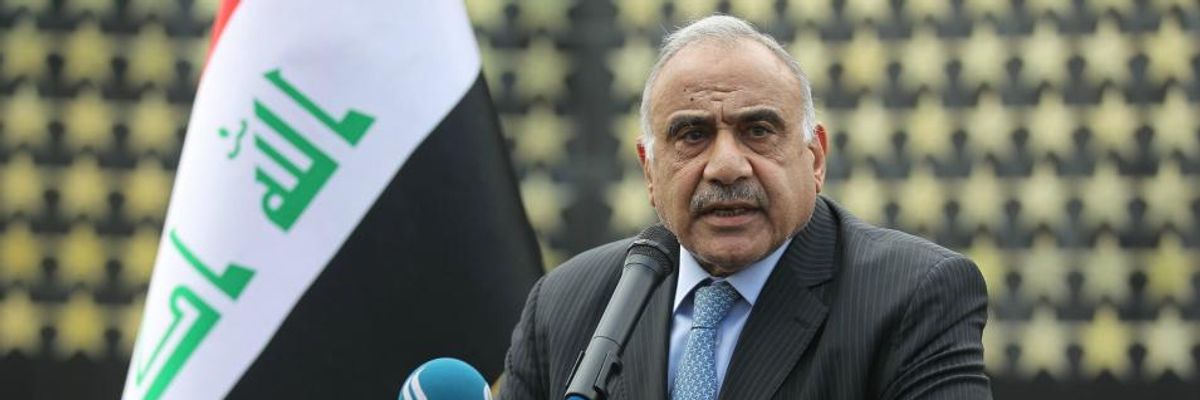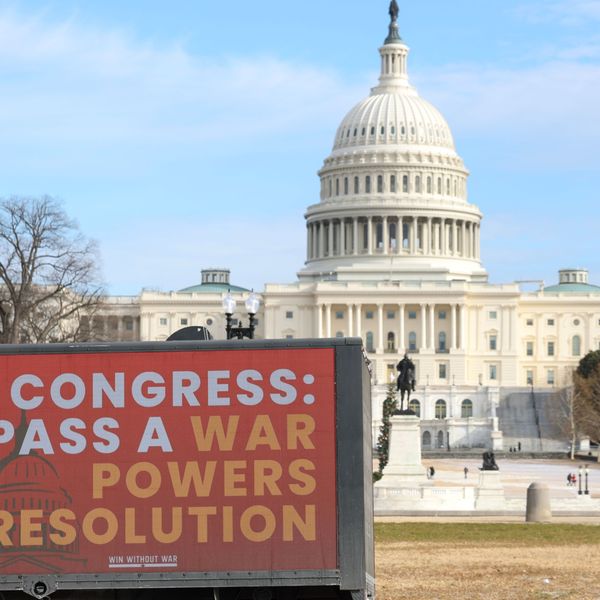
Iraq's Prime Minister Adel Abdel Mahdi speaks during afuneral ceremony in Baghdad on October 23, 2019. (Photo: Ahmad Al-Rubaye/AFP via Getty Images)
Iraqi Parliament Votes to Expel All American Troops and Submit UN Complaint Against US for Violation of Sovereignty
"What happened was a political assassination. Iraq cannot accept this."
Update:
Iraq's parliament voted in an extraordinary session Sunday to expel all American troops from the country and file a United Nations complaint against the U.S. for violating Iraq's sovereignty with its assassination of Iranian General Qasem Soleimani in Baghdad.
Ahead of the vote, chants of "No, no, America" rang out inside the hall.
"Iraq called on the U.N. Security Council to condemn the bombing and assassinations," Iraq's foreign ministry said in a statement following the vote.
\u201cBreaking: #Iraqi parliament votes for the withdrawal of all U.S forces and the "Global Coalition" from the country, & submit a complaint to the United Nations against the U.S for violating the sovereignty of Iraq.\u201d— Mustafa Habib (@Mustafa Habib) 1578234851
As The National reported, the Iraqi parliament approved "a five-point action plan that would require the Iraqi government to end the presence of foreign troops in the country, and withdraw its request for assistance from the anti-ISIS global coalition."
"Parliament also called on the government to ban the use of Iraqi airspace by any foreign power," according to The National. The resolution is non-binding, and the plan to expel American troops still requires the approval of the Iraqi government.
The U.S. currently has around 5,000 troops stationed in Iraq.
Earlier:
Speaking before an extraordinary session of parliament Sunday, Iraq's outgoing Prime Minister Adil Abdul-Mahdi recommended that the nation's lawmakers approve a measure to end U.S. troop presence in "immediately" following the assassination of Iranian General Qasem Soleimani in Baghdad.
The prime minister's remarks came before Iraqi lawmakers are set to vote on a resolution to end permission for American troops to remain in Iraq.
Washington Post reporter Mustafa Salim summarized Mahdi's recommendations:
\u201c\u201cBut I want the decision to be agreed by all therefore I put to the parliament two options. 1.ending the existence of these forces immediately and start the immediate arrangements for this\u201d 2. Set a timeline for the departure of these forces\u201d said Iraqi PM\u201d— Mustafa Salim (@Mustafa Salim) 1578231387
\u201c\u201cI recommend the first option and keep the friendship between US and Iraq. It\u2019s the interests of Iraq and US to Reorganize the relationship between both sides in a way keeps the sovereignty of Iraq\u201d Iraqi PM said.\u201d— Mustafa Salim (@Mustafa Salim) 1578231444
The U.S. assassination Soleimani on Iraqi soil was met with fierce condemnation from Iraq's foreign ministry and the prime minister, who called the drone strike a violation of the nation's sovereignty.
"What happened was a political assassination," Mahdi said. "Iraq cannot accept this."
In a previously undisclosed detail one observer described as "stunning," Mahdi said Soleimani was in Baghdad to meet with him about a Saudi request for dialogue to relieve tensions in the region--not, as the U.S. has claimed, to plan attacks against American forces.
An Urgent Message From Our Co-Founder
Dear Common Dreams reader, The U.S. is on a fast track to authoritarianism like nothing I've ever seen. Meanwhile, corporate news outlets are utterly capitulating to Trump, twisting their coverage to avoid drawing his ire while lining up to stuff cash in his pockets. That's why I believe that Common Dreams is doing the best and most consequential reporting that we've ever done. Our small but mighty team is a progressive reporting powerhouse, covering the news every day that the corporate media never will. Our mission has always been simple: To inform. To inspire. And to ignite change for the common good. Now here's the key piece that I want all our readers to understand: None of this would be possible without your financial support. That's not just some fundraising cliche. It's the absolute and literal truth. We don't accept corporate advertising and never will. We don't have a paywall because we don't think people should be blocked from critical news based on their ability to pay. Everything we do is funded by the donations of readers like you. Will you donate now to help power the nonprofit, independent reporting of Common Dreams? Thank you for being a vital member of our community. Together, we can keep independent journalism alive when it’s needed most. - Craig Brown, Co-founder |
Update:
Iraq's parliament voted in an extraordinary session Sunday to expel all American troops from the country and file a United Nations complaint against the U.S. for violating Iraq's sovereignty with its assassination of Iranian General Qasem Soleimani in Baghdad.
Ahead of the vote, chants of "No, no, America" rang out inside the hall.
"Iraq called on the U.N. Security Council to condemn the bombing and assassinations," Iraq's foreign ministry said in a statement following the vote.
\u201cBreaking: #Iraqi parliament votes for the withdrawal of all U.S forces and the "Global Coalition" from the country, & submit a complaint to the United Nations against the U.S for violating the sovereignty of Iraq.\u201d— Mustafa Habib (@Mustafa Habib) 1578234851
As The National reported, the Iraqi parliament approved "a five-point action plan that would require the Iraqi government to end the presence of foreign troops in the country, and withdraw its request for assistance from the anti-ISIS global coalition."
"Parliament also called on the government to ban the use of Iraqi airspace by any foreign power," according to The National. The resolution is non-binding, and the plan to expel American troops still requires the approval of the Iraqi government.
The U.S. currently has around 5,000 troops stationed in Iraq.
Earlier:
Speaking before an extraordinary session of parliament Sunday, Iraq's outgoing Prime Minister Adil Abdul-Mahdi recommended that the nation's lawmakers approve a measure to end U.S. troop presence in "immediately" following the assassination of Iranian General Qasem Soleimani in Baghdad.
The prime minister's remarks came before Iraqi lawmakers are set to vote on a resolution to end permission for American troops to remain in Iraq.
Washington Post reporter Mustafa Salim summarized Mahdi's recommendations:
\u201c\u201cBut I want the decision to be agreed by all therefore I put to the parliament two options. 1.ending the existence of these forces immediately and start the immediate arrangements for this\u201d 2. Set a timeline for the departure of these forces\u201d said Iraqi PM\u201d— Mustafa Salim (@Mustafa Salim) 1578231387
\u201c\u201cI recommend the first option and keep the friendship between US and Iraq. It\u2019s the interests of Iraq and US to Reorganize the relationship between both sides in a way keeps the sovereignty of Iraq\u201d Iraqi PM said.\u201d— Mustafa Salim (@Mustafa Salim) 1578231444
The U.S. assassination Soleimani on Iraqi soil was met with fierce condemnation from Iraq's foreign ministry and the prime minister, who called the drone strike a violation of the nation's sovereignty.
"What happened was a political assassination," Mahdi said. "Iraq cannot accept this."
In a previously undisclosed detail one observer described as "stunning," Mahdi said Soleimani was in Baghdad to meet with him about a Saudi request for dialogue to relieve tensions in the region--not, as the U.S. has claimed, to plan attacks against American forces.
Update:
Iraq's parliament voted in an extraordinary session Sunday to expel all American troops from the country and file a United Nations complaint against the U.S. for violating Iraq's sovereignty with its assassination of Iranian General Qasem Soleimani in Baghdad.
Ahead of the vote, chants of "No, no, America" rang out inside the hall.
"Iraq called on the U.N. Security Council to condemn the bombing and assassinations," Iraq's foreign ministry said in a statement following the vote.
\u201cBreaking: #Iraqi parliament votes for the withdrawal of all U.S forces and the "Global Coalition" from the country, & submit a complaint to the United Nations against the U.S for violating the sovereignty of Iraq.\u201d— Mustafa Habib (@Mustafa Habib) 1578234851
As The National reported, the Iraqi parliament approved "a five-point action plan that would require the Iraqi government to end the presence of foreign troops in the country, and withdraw its request for assistance from the anti-ISIS global coalition."
"Parliament also called on the government to ban the use of Iraqi airspace by any foreign power," according to The National. The resolution is non-binding, and the plan to expel American troops still requires the approval of the Iraqi government.
The U.S. currently has around 5,000 troops stationed in Iraq.
Earlier:
Speaking before an extraordinary session of parliament Sunday, Iraq's outgoing Prime Minister Adil Abdul-Mahdi recommended that the nation's lawmakers approve a measure to end U.S. troop presence in "immediately" following the assassination of Iranian General Qasem Soleimani in Baghdad.
The prime minister's remarks came before Iraqi lawmakers are set to vote on a resolution to end permission for American troops to remain in Iraq.
Washington Post reporter Mustafa Salim summarized Mahdi's recommendations:
\u201c\u201cBut I want the decision to be agreed by all therefore I put to the parliament two options. 1.ending the existence of these forces immediately and start the immediate arrangements for this\u201d 2. Set a timeline for the departure of these forces\u201d said Iraqi PM\u201d— Mustafa Salim (@Mustafa Salim) 1578231387
\u201c\u201cI recommend the first option and keep the friendship between US and Iraq. It\u2019s the interests of Iraq and US to Reorganize the relationship between both sides in a way keeps the sovereignty of Iraq\u201d Iraqi PM said.\u201d— Mustafa Salim (@Mustafa Salim) 1578231444
The U.S. assassination Soleimani on Iraqi soil was met with fierce condemnation from Iraq's foreign ministry and the prime minister, who called the drone strike a violation of the nation's sovereignty.
"What happened was a political assassination," Mahdi said. "Iraq cannot accept this."
In a previously undisclosed detail one observer described as "stunning," Mahdi said Soleimani was in Baghdad to meet with him about a Saudi request for dialogue to relieve tensions in the region--not, as the U.S. has claimed, to plan attacks against American forces.

